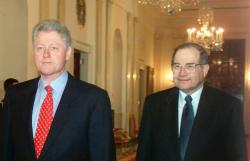Neal Lane, who was Bill Clinton’s science adviser from 1998 to 2001 and head of the National Science Foundation from 1993 to 1998, wrote an op-ed in the New York Times yesterday arguing against Mitt Romney’s budget plan, on the grounds that “Science Is the Key to Growth.” Lane’s argument runs roughly as follows: Bill Clinton “balanced the budget and achieved strong growth” because he invested in science. But this argument is full of holes. George W. Bush’s administration also invested in science—as Lane writes, Clinton’s doubling of the National Institutes of Health budget was completed under Bush—but the economy went into a tailspin during his administration. Even the most potentially lucrative discovery in “basic research” (which Lane highlights as being especially important) takes years to come to market from the initial research investment, so one administration’s spending patterns won’t be reflected in the economy until long after they’ve left office. Lane’s attribution of Clinton’s budget surpluses to the Human Genome Project is either disingenuous or silly or both. It is good that Clinton brought the budget to surplus, and good that he funded the Human Genome Project, but one had nothing to do with the other.
As Lane’s own NSF reported in its Science and Engineering Indicators 2012, “Over the last 5 years (2004–09), annual growth in U.S. R&D spending averaged 5.8%.” The same cannot be said for GDP growth over those years, when the economy went into a tailspin. Lane’s argument opens the door for budget hawks to say: We spent on science because you promised it would lead to economic growth. It didn’t. Therefore, we should cut scientific funding. They would be perfectly correct in saying this.
I happen to agree with Lane that federal investment in basic research is an important function of the government and should be increased from present levels. But if we are honest, we’ll admit that economic growth and job creation have little to do with basic scientific research.
I will instead make an utterly unfashionable argument. The government should fund basic research because, over the long run, it has the capacity to make the world a better place. Pursuing discovery for its own sake is a worthy end. But this argument turns on a view of government as something more than a libertarian thin shell. It hinges on thinking that it is fair and desirable to tax the construction worker and the hedge-fund manager a little bit so that the astronomer can buy a new telescope, or the embryologist a new microscope.
This is an uncomfortable argument to make in the current populist climate. But promising that science will save the economy is, while slicker salesmanship, ultimately untrue. For all the anti-scientific rhetoric of the religious right, the federal government has, overall, spent just as generously on R&D under Republican administrations as Democratic ones. Indeed, the biggest decline of federal R&D spending as a percentage of GDP in recent decades took place under Bill Clinton. (To be fair, non-defense R&D grew in real terms under Clinton, primarily through growth in the NIH budget.)
Government spending on research and development is a tangled web: defense and non-defense spending, basic vs. applied research, federally funded research centers versus grants given to academia and industry. As such, it’s possible to extract elements of this web in the service of one or another ideological argument. But there is no clear evidence that the answer to the question Lane asks: “Want to boost the economy?” is in fact his answer, “invest in science.” Until scientific spending can be squarely defended on its own grounds—as a good in itself—it will be vulnerable to the budget hatchet-men every time the economic outlook dims, as it surely will again.
